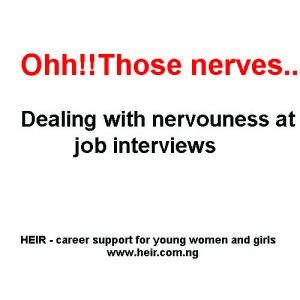 “I get nervous when I don’t get nervous. If I am nervous, I know I am going to put on a good show” – Beyonce Knowles.
“I get nervous when I don’t get nervous. If I am nervous, I know I am going to put on a good show” – Beyonce Knowles.
I have (like most people) experienced nervousness at one point or another and especially when at a place or situation that needs you to create an impression to someone or group of people you are meeting for the first time.
The feeling encountered takes on may forms like a rumbling stomach, sweaty palms, distorted speech, temporary memory loss, shaky feet, rambling, fear, unable to smile, dry mouth, heart beats too fast, breathing issues and some form of tiredness to some.
Nervousness can affect the most confident and prepared person. Dealing with it takes awareness of the likely symptoms and an understanding of how to manage them so that it does not get the better of you.
Try this 6 tips:
- Preparation – a lot of what we do centers on preparedness. The interview process isn’t left out. Take the time to practice, organise your thoughts, role play with a friend/partner/expert, research on the role, company, job description, practice your answers to likely questions, note down key talking points as well. Think of it this way – if you study for an exam to pass it, why do you think studying to ace an interview isn’t necessary?
- Pause– interviews are what they are. Have the understanding that you are in a conversation to show your eligibility for that role. And when you find yourself forgetting what was asked or you have no idea what the answer maybe because the nerves have kicked in, just pause. Take a minute to think things through and collect your thoughts before launching in again to answer the questions.
- Please, breath!- I mean this literally. Shortness of breath can also be from trying to hold your breath in so that you can just rush out those words. This can make you get more agitated. We need you alive after the interview so please breath in and out while taking the time to respond. If you are offered a glass of water, accept it. You may need it if you experience dry mouth.
- Ask the question again– this is a statement you should get used to. Do not feel it is a crime to request that the interviewer repeats him or herself. It does not make you look or sound dumb. For clarity purposes, ask for the question again especially if you know you did not understand it at first. It is better to do this than to assume and ramble on or talk off the mark.
- Arrival– following on from point number 1, get yourself ready and check you have the location, how to get to the interview, appropriate wardrobe and grooming, office number (incase you need to ring in for an emergency), method of the interview, time zones (where applicable), the job/role information on who you are to meet. Aim to arrive 10-15mins early so that you can relax, calm down, have a chit chat with those you see at the building or simply collect your thoughts.
- Take notes– summarise and note down at least 5 things you need the interviewer to know about you. List any questions you may have that needs more clarity, jot down points as they answer your questions. This points back to preparation.
Remember that interviews are an evaluation of your suitability for that role/job at that particular point in time. Many factors inform the decision of the recruiter so never exit an interview feeling like a failure and always put in your best at all times.
Follow our social media handles @heirwoman on Facebook, Instagram and Twitter and get the career support you need.
